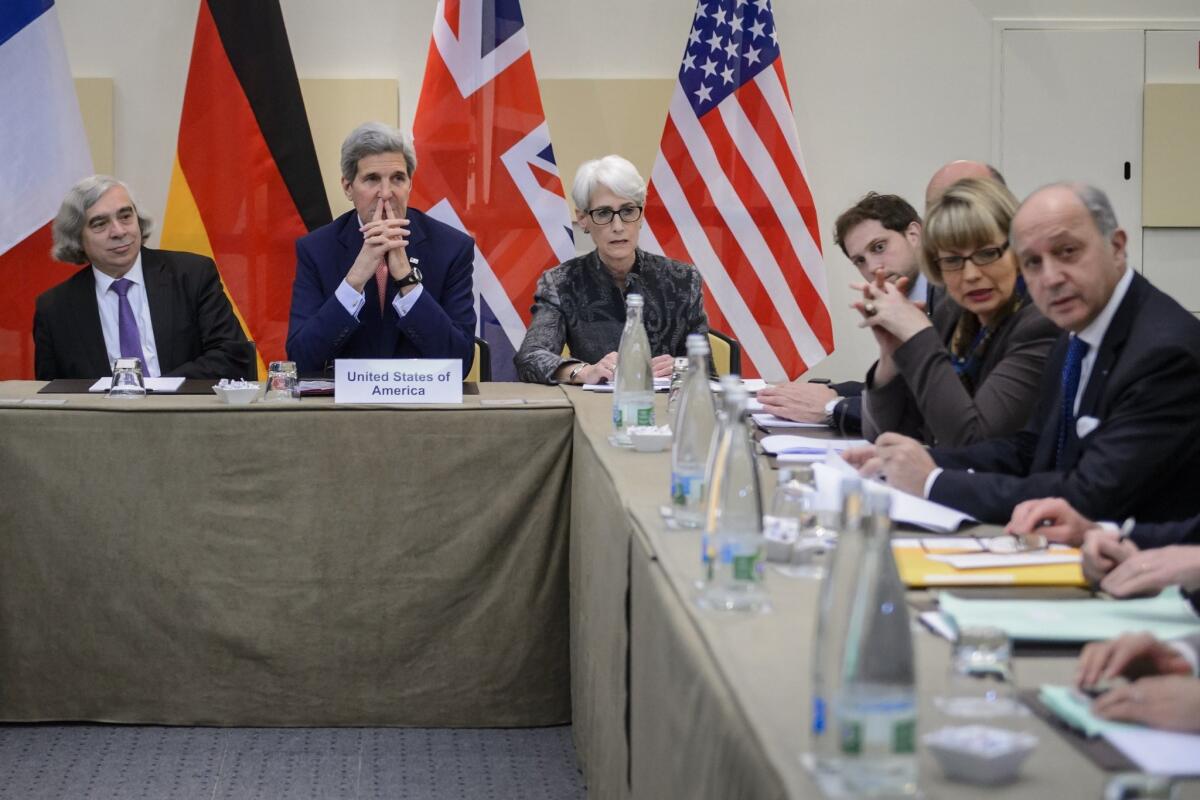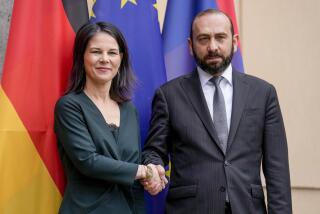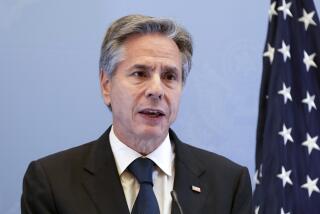Top officials join Iran nuclear talks as deadline nears

French and German foreign ministers joined international negotiations on Iran’s nuclear program here Saturday as the 18-month-old talks entered a tense endgame ahead of a Tuesday deadline.
While both Iranian and Western officials had set their sights on completing a preliminary agreement during the weekend, diplomats acknowledged that gaps remained on several issues and made no promises about when they would complete their work.
“We’ve advanced on certain issues, not yet enough on others,” French Foreign Minister Laurent Fabius told reporters after arriving at the neo-baroque Beau Rivage Palace hotel where the talks are being held.
The final issues “are the most difficult, but also the most decisive,” said German Foreign Minister Frank Walter Steinmeier. “We have entered the endgame.”
Iran, the United States and five other world powers – France, Britain, Germany, Russia and China – are seeking an agreement that would ease economic sanctions on Iran if it accepts restrictions aimed at preventing it from gaining nuclear weapons capability. The group is seeking to work out a broad outline of the agreement by Tuesday, and to complete a fully detailed deal by the end of June.
A senior State Department official, in a statement Saturday night, raised the possibility that the two sides might not be able to reach a deal. “We expect the pace to intensify as we assess if an understanding is possible,” said the official, who was not identified under ground rules often invoked by the department.
The Russian, Chinese and British foreign ministers are expected to arrive later this weekend. The top diplomats generally show up to settle remaining disagreements and provide official blessing when such a deal is near completion.
Also on Saturday, Iranian President Hassan Rouhani said on Twitter that he had spoken by phone to German Chancellor Angela Merkel about the nuclear negotiations. Both leaders agreed on the importance of reaching a deal, he said.
The final hours before deadline are typically when important issues are resolved, and when parties maneuver for advantage. Fabled as tough negotiators, the Iranians are under less time pressure than Secretary of State John Kerry and his team, since Congress is threatening to add new sanctions on Iran, or halt talks if it doesn’t see results this month.
But U.S. officials have insisted in the round of top-level negotiations that began Thursday that they were ready to remain at the table if Iran didn’t budge. Late on Friday, a senior State Department official issued a statement saying Iran needed to make some choices if a deal was to be reached.
Kerry seemed to be trying to signal his patience at lunchtime, when he slipped into his black biking suit and went for a ride along the shores of Lake Geneva.
Fabius’ view of the terms of the deal is another important unknown. French officials have signaled in the last 10 days that they believe the deal should be toughened up by extending its duration and retaining key sanctions on Iran for as long as possible.
Iranian officials are saying they believe some of the most important conflicts are between the Western governments. U.S. and European officials insist there is unity on the important points.
Fabius said he wanted the group to move toward a “robust” accord. He cited the need to ensure that Iran’s program is closely monitored, and that there are “controls, to see that the commitments made are respected.”
Fabius was pointing to one of the potential weaknesses of the deal. The history of arms control agreements suggest world powers are generally reluctant to move decisively – with military force, for instance – if a country is found to be breaching arms control rules.
Instead, suspected rule violations open lengthy legalistic disputes. Many observers and critics, including Israeli Prime Minister Benjamin Netanyahu, have urged the negotiators to craft some sort of mechanism that ensures world powers would move decisively if Iran began cheating.
While the Western diplomats were declaring that Iran needed to bend, the Iranian delegation insisted they were flexible and the other side wasn’t.
“In a negotiation, both sides must show flexibility,” Iranian Foreign Minister Mohammad Javad Zarif said on Twitter. “We have, and are ready to make a good deal for all. We await our counterparts’ readiness.”
Ali Akbar Salehi, the chief of Iran’s atomic energy organization, told the Iranian Students’ News Agency that “one or two technical issues have become complicated…. All the issues are intertwined.”
There are even some issues to be ironed out on the logistical side. While Western officials prefer to keep the talks going at the Beau Rivage Palace, the Iranians want to move the announcement of a deal to the United Nations’ Palais des Nations building in Geneva.
The Iranians want any announcement of an agreement to be televised against the backdrop of a U.N. facility, believing that gives the deal greater legitimacy and helps erase the image of Iran as a nuclear pariah state.
paul.richter@latimes.com
More to Read
Start your day right
Sign up for Essential California for news, features and recommendations from the L.A. Times and beyond in your inbox six days a week.
You may occasionally receive promotional content from the Los Angeles Times.







